UK small to midsize enterprises (SMEs) have encountered many challenges over the last five years. Brexit, COVID-19, and then the cost of living crisis have battered businesses in quick succession. What can smaller companies do to prepare and manage when business crises occur?

Press releases published this year
Crises in a business can occur at any time and can take many shapes. SME owners need to have a real-time view of business performance to consider these potential threats and have an action plan in place for small business crisis management.
As we saw in our look into the pressures of UK electricity prices on smaller companies during 2022, businesses in the UK have had to adapt quickly to the realities of sudden cost rises. However, business energy price rises are just one type of crisis that can engulf a small firm.
There are factors such as staff shortages, data breaches, reputational damage, and technical or energy outages which can cause both long and short-term harm to companies that experience them. Yet, knowing what to do when these issues arise can mitigate the damage done.
So, how does a small business owner plan for future crises?
GetApp talked with five small firm owners with experience in handling significant crisis situations in their company. From this, we identified three essential tips that UK SME owners can use to form their own crisis response plan in the current climate.
1. Have a crisis management plan ready in advance
“If you fail to plan, you plan to fail”, as Benjamin Franklin once said, many centuries ago. This mantra still holds true today. It is vital to anticipate possible crises before they happen and having a robust crisis plan is a key part of that.
David Davies, the owner/founder of Sovereign Brewing Company, explained to GetApp why in smaller firms this is even more important.
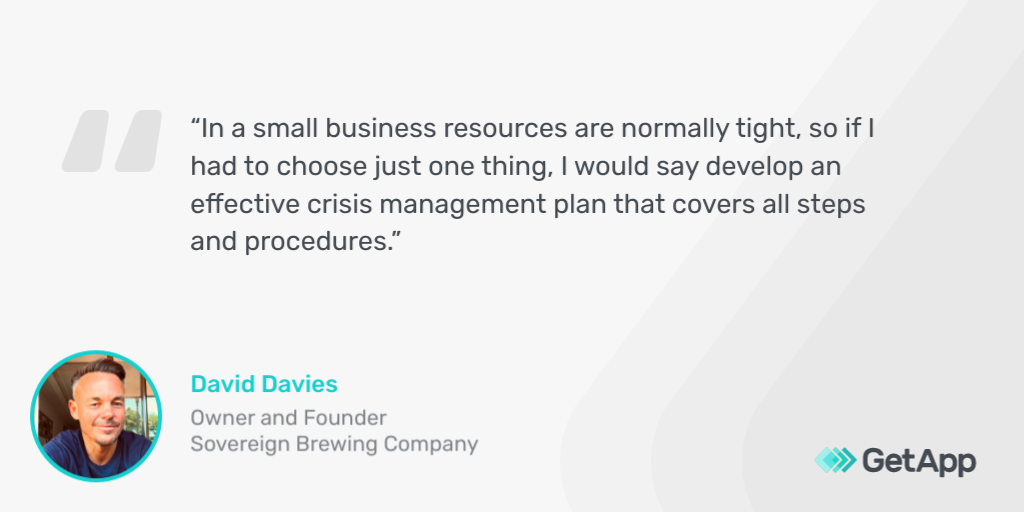
This sentiment was echoed by Barney Packer, the founder of Modern Classic Digital, who also emphasised forward planning and anticipation of future issues.
“The first thing is to predict the crisis. Prepare what the scenario might be and what you might need to do. But, the most important part, whether you’ve anticipated the crisis or not, is not to act on emotion. This will make the crisis much worse and potentially affect your clarity and decision-making.”
Having a crisis management strategy prepared in advance can help owners and managers keep a cooler head and manage a crisis scenario more effectively if it does arise.
Deepak Tailor, the founder of online business LatestFreeStuff.co.uk, also highlighted the importance of making sure a crisis plan assigns responsibility, outlines how the issue will be communicated, and designates where the response needs to be focused when an emergency occurs.

Having an idea of how roles can be assigned can prove helpful in crisis preparation. This allows relevant stakeholders to know who to contact when something is going wrong, or for those responsible to spot the right moment to react. This may even involve setting up a designated crisis management team amongst your current staff, who can be the ones to create a contingency plan and put it into action when needed.
Lastly, crisis plans should be updated on a regular basis. David Davies explained this is vital to ensure that “it stays relevant and will protect your business during challenging times.” Businesses and the economy are always evolving. It can therefore help to set aside some time every year to address any new developments to ensure you’re ready to react no matter the circumstances.
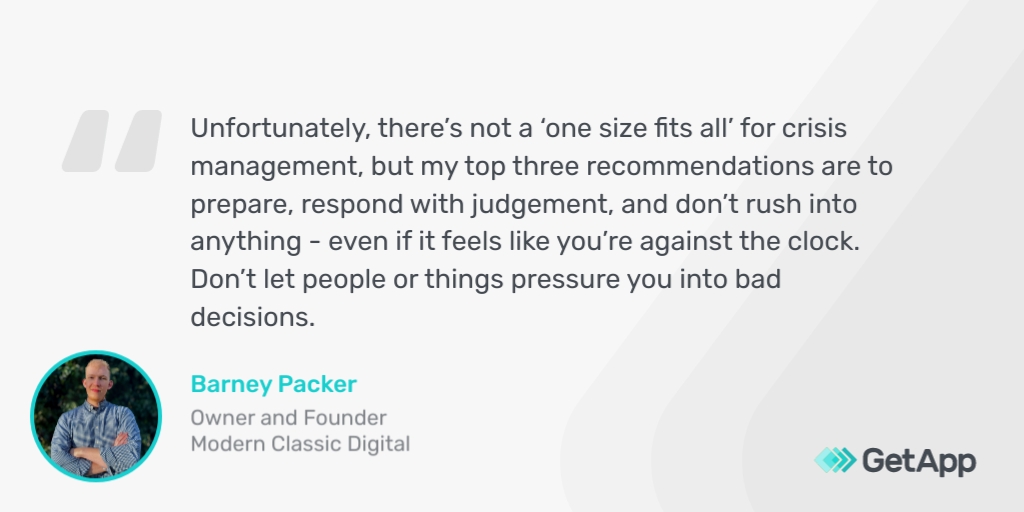
2. Focus on financial health
Finances are integral to a company’s survival, no matter its size. Accordingly, being mindful of how money flows in and out of the organisation is a key concern in a small business. Monitoring the situation properly can help avoid unpleasant surprises. However, there are many factors at play when preparing to deal with a liquidity or cash flow crisis.
Analyse the company’s financial data
Regardless of their current situation, companies always need to have a clear picture of their finances. This not only helps businesses to spot where problems could be arising right now, but it can also help to identify future issues further down the line.
Matthew Layton, the Director and Manager of Rewind Creative digital agency, told GetApp about some of these considerations. Specifically, the importance of reviewing vital data and checking the overall profit and loss information to get an effective idea of your cash flow.
As he explained, “Identify areas where you can cut costs and increase revenue. Set specific financial goals and determine what you want to achieve with your financial plan and how you will measure success. This could include goals such as reducing expenses, increasing cash reserves, or generating a certain amount of revenue.”
Take care with cash flow
The danger of crises affecting SMEs is the loss of momentum that they can have on day-to-day business. A sudden loss in productivity or a complete halt can have devastating financial consequences and may be hard to recover from down the line.
Matthew Layton gave an example, from his own company’s formative years, of how this can arise in smaller and newer companies. He explained, “In the early days, I faced challenges with clients from delayed payments or not adhering to the agreed terms, which in turn impacted our cash flow and forecasting, making it challenging to plan for the future.”
Delayed payments are more common than many people imagine for businesses, which can be especially difficult for small firms. For example, in August this year, hundreds of small businesses faced a significant cashflow crunch when the online marketplace Etsy withheld up to 75% of revenue for up to 45 days from its UK vendors.
In Matthew Layton’s situation, the answer to the challenges he and his organisation faced was to work closely with clients to create clear expectations and agreements on payment.

Naturally, what can be managed should be accounted for to avoid shocks down the line. This can avoid the headaches of a lack of promised money when it’s needed or the time-consuming process of chasing up unpaid bills.
Be creative to find savings
Creativity in a crisis is not always an easy task when approaching money management for small businesses. However, inventive solutions are often the factors which can make the most difference.
Huw Moxton, the marketing manager of small business advisor service Informi, considers this from the perspective of creating cash reserves to have in store for when future crises occur.
“SMEs should strive to build a financial reserve to mitigate any impact of a financial shock and cost rises. This can be done in a number of ways, including implementing effective cost-cutting measures, diversifying revenue streams, and exploring new markets to reduce any dependency on a single source.”
Cost cutting can be an intimidating process but it is sometimes necessary. However, with careful analysis, solutions can be found.
For instance, Deepak Tailor faced this with his firm’s property costs. He explained, “[The] jump in rental was difficult for us to manage as we didn’t have such a jump in income to cover these price rises. It made it tricky for us to manage and we considered whether we needed to even have such a large office space with the momentum of working from home”.
David Davies faced similar concerns with rental expenses and also considered his options. The way he chose to handle this was to take his company remote. As he explained, “We have gone remote which means that we are no longer paying for offices and all the bills that go in tandem with having the team in the office.”
However, not all businesses approach this decision the same way. Deepak Tailor, for instance, took his company in a different direction.
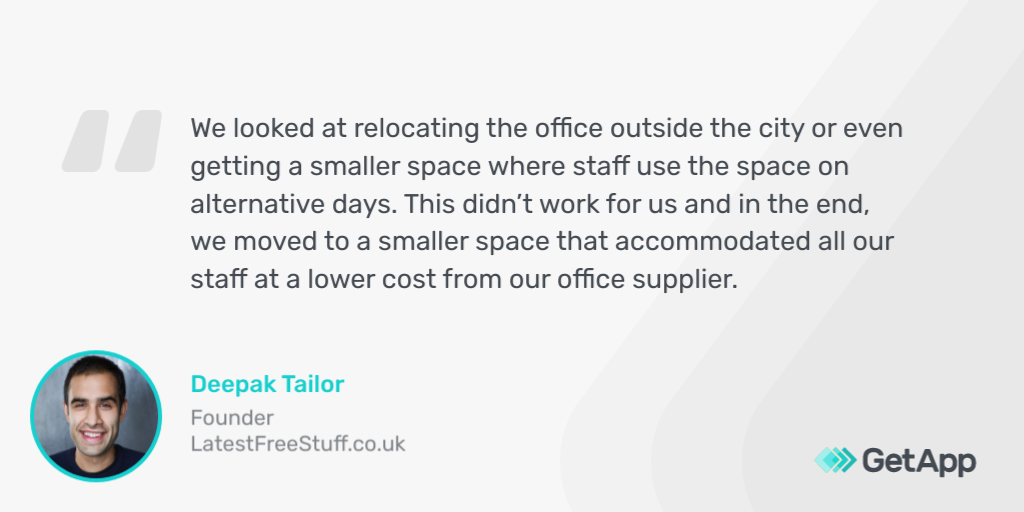
As seen, going to a remote working model isn’t a single ‘silver bullet’ solution for cost-cutting and it will vary from company to company. However, it is important to look carefully at the bigger picture to decide how to streamline property costs efficiently.
3. Communicate with stakeholders
When a small business is faced with difficulties it can feel like it's time to batten down the hatches rather than open up. However, communication during a crisis can make a huge difference in mitigating a problem.
Many of the experts we spoke to agreed that when serious issues occur, it is important to make sure the key stakeholders are aware. Naturally, this means informing staff of what is going on.

Informing staff may feel uncomfortable but it is essential for maintaining trust and transparency. This can be crucial for company cohesion in the longer term, especially when working with a smaller team.
However, it is not only staff who are impacted by a crisis and must be informed. Customers and suppliers also need to be kept in the know in many cases. In practice, this means mapping out the people who will be affected if the disruption breaks existing agreements or delays important deadlines.
Crisis communication requires informing those affected of contingency plans and setting clear expectations of new timeframes. This might not be easy but it can go a long way to help reduce the possible damage.
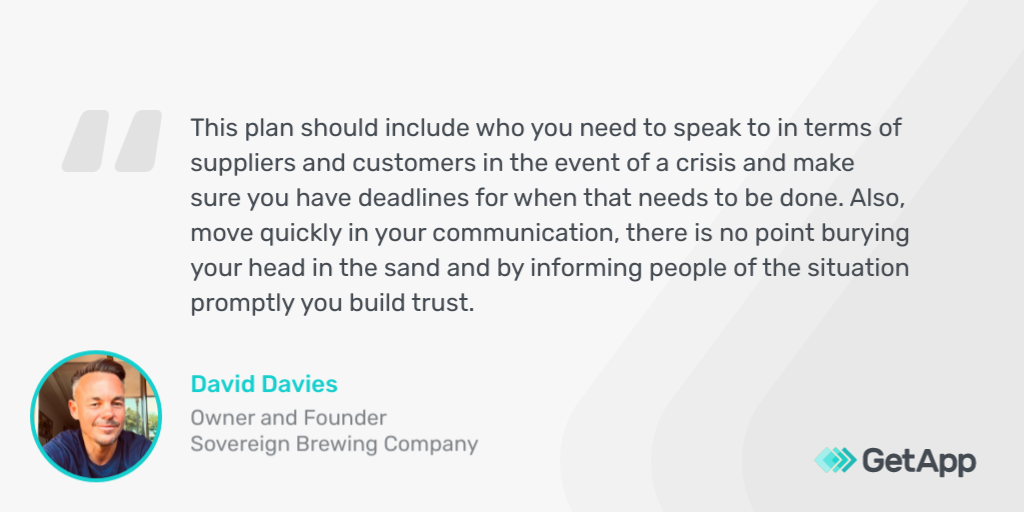
Keep customers front of mind
It’s hard to have missed the noticeable rises in prices across the UK due to high inflation over the last 12 months. Whilst the rate of consumer price inflation is falling from highs of just under 10% in mid-2022, it still sits at 5.9% as of August 2023.
Naturally, rising prices are a consequence of high national inflation. However, costs rising for businesses can lead to higher prices for consumers, which can lead to lost sales as the public prioritises spending on essentials. As Barney Packer explains, “The cost of living crisis has had a significant impact as people are now more cautious with their money and how they spend it.”
How can SMEs adapt to this new reality? One way this can be handled is by being transparent and coming clean to customers about the reality of the situation. As David Davies outlines:
“What we did was, rather than try and profit from the increases, we obtained letters from our suppliers to explain why the increase was taking place. We made sure we had calls with customers and answered any questions and communicated what was happening, and why, as clearly and transparently as we could.”
Naturally, price rises cannot always be avoided, especially if costs from suppliers start growing. Adjusting pricing can be tricky in these circumstances but with transparency —and by adjusting costs to consumers sensibly— these challenges can be weathered more easily.
Furthermore, pricing optimisation software can help soften the blow with the help of insights such as competitor analysis, revenue goal setting and product availability to help SMEs plan price rises that won’t alienate the customer base.
Find the common ground
A crisis can also be an opportunity in some circumstances. Whilst issues like the cost of living crisis are tricky to navigate, they do offer SMEs the chance to enhance their connections with their client base.
Barney Packer, for instance, told GetApp about how the recent cost rises allowed him to build stronger relationships with customers. He did this by offering solutions to customers that took into account the financial pressures most other businesses found themselves in.
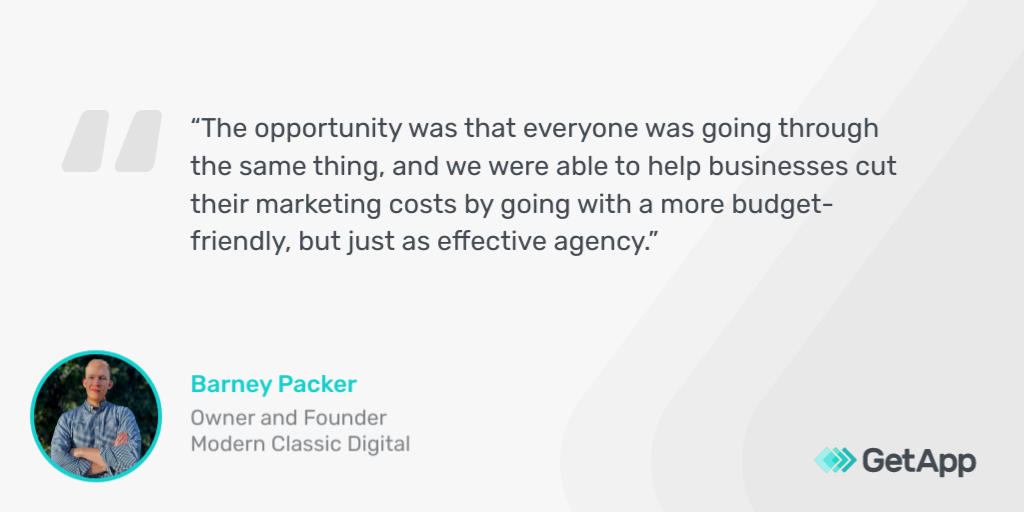
When everyone is faced with a crisis it is important to find ways to adapt an SME to the new scenario that allows the business to keep running but that can build loyalty down the line. A crisis doesn’t last forever, however, the response is often felt long after, and not always in negative ways.
Preparation is half the battle
A crisis response forces businesses to respond fast to sudden change. Whilst it is impossible to preempt every risk that a small company could come across, having a decent plan of what to do if common issues come to pass can make the difference between sinking or swimming.
As we observed when speaking to experienced SME owners, there are three important ways to confront and plan for crises.
- Make your crisis management plans now to overcome a potential threat
- Keep an eye on your firm’s financial health on an ongoing basis
- Communicate clearly and honestly with those affected internally and externally
Time is of the essence in a sudden business emergency, therefore a plan of action and knowing what to prioritise is critical. Businesses need to ensure they are collecting essential data from within the firm and are checking it regularly to spot any potential challenges emerging.
Contributors
To gather information for this article, GetApp spoke to five SME owners and experts to learn more about what managers and founders can do to address significant business issues.
Our five interviewees were:
Barney Packer, the founder and director of digital PR agency Modern Classic Digital.
David Davies, the founder and owner of import-export company Sovereign Beverage Company.
Deepak Tailor, the founder of free sample website Latestfreestuff.co.uk.
Huw Moxton, the marketing manager of small business advice service Informi.
Matthew Layton, the managing director of digital agency Rewind Creative.
NOTE: This article is intended to inform our readers about business-related concerns in the United Kingdom. It is in no way intended to provide financial advice or to endorse a specific course of action. For advice on your specific situation, consult your accountant or financial consultant.
